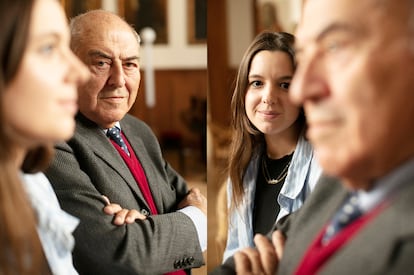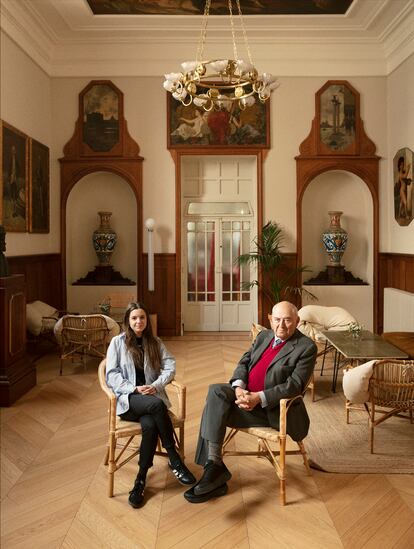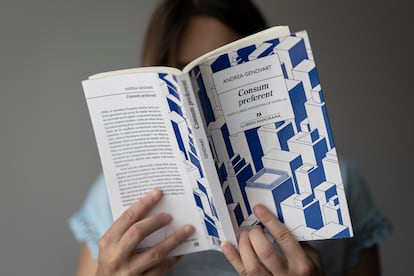Are we really afraid? Or is it just uncertainty?
The 30-year-old novelist Andrea Genovart and the 84-year-old essayist José Antonio Marina discuss the fears and doubts of the present and the future

Nearly two decades ago, the Spanish essayist and philosophy professor José Antonio Marina, 84, published Anatomía del miedo: un tratado sobre la valentía [Anatomy of Fear: A treatise on courage], where he broke down the entire genealogy of “the great family of anguish, unease, terror and vulnerability.” And, just two months ago, Andrea Genovart – a 30-year-old novelist from Spain’s northeastern region of Catalonia – won a prestigious literary prize, Premio Anagrama, with her novel Consum Preferent, written in a zany combination of Spanish-Catalan-French-English-and more. Besides its impact in terms of literary style, the book is a bitter and satirical portrait of her generation: the one caught between the economic crisis of 2008 and the Covid pandemic of 2020.
EL PAÍS invited both writers to the Ateneo de Madrid – a private cultural institution located in the capital of Spain – to discuss fears, bravery, doubts, conformism, skepticism, cowardice and anger.
Question. We seem to be surrounded by fear, whether it be fear of climate change, fear of losing our job, fear of not fitting in, fear of artificial intelligence, fear of polarization, fear of another pandemic, fear of war, fear of our loved ones being in danger, fear of God… or just plain old fear, inexplicable fear. Has this always been the case? Or is it more prevalent today?
José Antonio Marina. One of the most lasting feelings in humanity is fear. It’s been a great social organizer: power has always been dedicated to fear. [Power often] prevails because of fear. Machiavelli assumed that people could be commanded either through love or through fear. It would be better [if we were more susceptible] to love, but fear is more effective.
Andrea, I wanted to ask you something: I don’t know if the new generations — who, logically. should feel very afraid of future uncertainty — have somehow adapted to fear, because they don’t expect too much [from the world]. What do you think?
Andrea Genovart. Yes, I believe that, in fact, uncertainty has been so assimilated to the point that we’re unable to [look towards the future]. And that’s totally paralyzing. Oftentimes, fear acts as a political engine. And I believe that we’re now in a moment in which fear is combined with depression. Maybe in the past, fears were more concrete: there were wars, diseases, etc. But nowadays, I have the feeling that some of our [fears] have no reasoning. For example, the fear of the future. Or the fear of climate change, which is like the idea of the apocalypse. In my generation, there’s an unidentifiable fear, something that runs through you. It has no [precise cause], but it’s a state of being.
J. A. M. I think you’re right, Andrea. Therefore, when we [study] fear, we see that fear is the awareness of a danger that has appeared. It’s a very basic feeling, a feeling like anxiety. When the danger is concrete and can be determined, then it manifests itself as fear. But when [the danger isn’t concrete] and you still have anxiety, technically, that’s a state of anguish.
A. G. Isn’t it contradictory, by definition, to talk about fear of the future, since the future cannot be defined? Shouldn’t we use the word “anguish” instead?
J. A. M. We should also use “uncertainty.” Uncertainty means that the amount of information we have is so gigantic that, instead of limiting uncertainty, it increases it. Another thing is ambiguity, which is the difficulty of understanding what’s happening. And that feeling — which causes one to say “I don’t understand what’s happening” — is [prevalent] among the younger generations and has given rise to something that worries me. This is when people say, “look, I don’t understand it, so maybe it’s not so important.” There’s a kind of decline in the need to understand things. And that seems dangerous to me. The character in your novel represents something like this.
A. G. One thing that’s very characteristic of our generation (millennials) — something that makes us settle into a state of great skepticism, or cynicism — is [the notion] that it’s useless to learn or politicize ourselves or anything, [because we’re] experiencing the collapse of the capitalist dream, which was the promise of effort and upward social mobility. I don’t think there’s much [confidence] in what progress is, or that progress is something that one can simply put into action. This makes [young people] settle into the inertia that you mentioned.
J. A. M. My former students — that is, those who are approximately your age, Andrea — have settled into something that seems kind of sad to me. It’s a kind of helplessness, but a comfortable helplessness. There’s no hope for the future... but hey, as long as I can enjoy the weekends. It’s actually kind of a resigned frustration.
Question. There are quite a few 30-year-olds who are happy because they don’t lack work… but they never last long in one job. They’re told that they work well, but it’s impossible to get them to stay for long.
A. G. The thing is that there are structures in place that are very precarious. In just four years, I’ve had to change apartments four times, with all the emotional toll that entails. There’s a professional logic based on temporary contracts. And all of that — not to mention the problem of relating sexually and emotionally — makes things extremely fluid. [Hence], everybody is always filling out job applications. I’m not justifying it and I don’t think that any of this will lead to a good outcome… but I understand that, in the end, the only consolation that young people have today is knowing that they can afford a beer or a dinner.
J. A. M. So, more than a feeling of fear of the future, there’s a feeling of acceptance of provisionality.
A. G. Yes, there’s an uprootedness.
J. A. M. I think that this [attitude] is saving many people from depression, but in another sense, I think that our young people aren’t very rebellious. And something more serious: young people are beginning to feel a disdain for freedom. In other words: “Well, freedom isn’t that important, at least as long as a kind of immediate freedom of choice is maintained.” You’re free? “Yes, because I have 10 brands of beer to choose from in the supermarket.” It’s a kind of limited freedom. And that, in my opinion, is one of the reasons that’s causing a shift towards illiberal democracies.

Question. In Andrea Genovart’s novel and in Anatomy of Fear, you both reflect on the lack of rebelliousness. José cites the German psychoanalyst Karen Horney and her concept of “the tyranny of the should,” regarding our struggle to live up to our ideal self. This conformism collides with the stress of “I have to,” “people expect me to,” etc.
A. G. I believe that, right now, our generation is at a brutal crossroads. On one hand, the generation has never felt so free… we feel very free in the sense of sexual freedom, in being able to participate in social movements and alternative media. But, at the same time, we’re slaves to capitalist dynamics, which, I believe, are more solid than ever. We fall into the danger of believing that we’re free.
J. A. M. Many things in the field of new technology occur within a framework of non-freedom. One of those decisive moments — which went almost unnoticed and continues to have lots of influence — is when Facebook introduced the “like button” into its programs… this idea that “I’m going to give you a little prize every time.” We’re all continually receiving small prizes… and that’s one of the things that makes us addicted to new technologies.
A. G. That element creates a real dependency on your self-image. There comes a time when you have to exist for others. It’s horrible that, when a person unsubscribes from social media, for example, it’s like they stop existing in the imagination of others.

Question. The French psychiatrist and essayist Marie-France Hirigoyen, author of books such as The New Solitudes, Moral Harassment or Narcissists Have Grabbed Power, writes that who you are no longer matters. She opines that only how you present yourself is what matters.
J. A. M. That’s a big fear today!
A. G. The thing is that, today, existence is defined in virtual terms, it’s [defined by] stimulation, as Jean Baudrillard once said. There’s an enormous amount of time and effort dedicated to staying up to date, posting and knowing what other people are posting. This chunk of time is already greater than what we dedicate to empirical and physical experiences.
J. A. M. What’s happening — and this is really scary — is that we’re getting used to consuming only short messages. These brief formats of expression are suitable for an advertising slogan, for a meme, for an insult… but not for an argument. Arguments require long texts. But we’re living amidst a type of social and political communication where time isn’t wasted on arguments.
A. G. You can see this very clearly on Twitter: 240 characters to describe what’s being uttered by political personalities, or to talk about climate change.

J. A. M. When I give courses to postgraduate philosophy students, I ask them a rapid-fire question: “Do you believe that all opinions are respectable?” And everyone tells me yes. And I tell them that they’re confused. One thing is the right of all people to say that their opinion is respectable, but it’s entirely another thing for it to be so, because certain opinions can be idiotic, offensive, slanderous... or nonsense, like saying that the Earth is flat. I said this at an event that I was invited to. And it was kind of crazy, they posted my comments on Instagram and I don’t know where else. It became a trending topic… but it’s so obvious! How can so many people be surprised? We’re in a superficial polyphony: all voices end up having the same value.
Question. The current educational level in certain areas related to critical thinking, the expression of opinions, conversational ability and essay-writing, causes some concern. Do you share this worry?
J. A. M. At this moment, the world is in a state of educational panic. We’re saying that 60% of the jobs that the boys and girls who are currently in school are going to work in haven’t even been invented yet. So, if we don’t know what field they’re going to work in — if we don’t know which conceptual systems, tools or problems they’re going to be facing — what the hell are we teaching them? Pedagogical thinking is operating at the same [capacity] as philosophical thinking: at a minimum.
Furthermore, we’re living in the attention economy. Managing political behaviors isn’t as important as managing attention. The CEO of Netflix already said it: “You get a show or a movie you’re really dying to watch, and you end up staying up late at night, so we actually compete with sleep.” Attention is a scarce commodity, as is critical thinking. It’s a serious problem that critical thinking is being discredited in elite universities in the United States. Many students are demanding that the university presidents shouldn’t introduce ideas that might bother them. That’s a serious problem… but the fact that the presidents agree with them is terrible.
Another terrible thing is happening: we belong to different tribes, which collapses the notion of universality. Each tribe has its own ideas. And so, the “woke” way of thinking says: “Look, I [have a] Black thought, or a queer thought, or a trans thought… and I’m not the least bit interested in explaining it to you, because I’m not interested in you understanding me. This is the truth of my group and I don’t care about the truth of yours.”
A. G. Well, I don’t think it’s problematic to banish the idea of universal truth. We could organize ourselves knowing that there’s none, while still accepting certain baselines.
J. A. M. But Andrea, if you ignore the idea of universality, plurality as such becomes worthless, because within the plurality, there can be Nazis. And if you dispense with the concept of universal truth, there’s no value in saying that all men and women are equal. If you ignore universal truth, Trump goes and tells the farmers in Ohio that climate change is a lie made up by some gentlemen from the Northeast. Denying the possibility of truths that are universally justifiable is more serious than it seems.
I’d like to return to the concept of comfortable helplessness that we talked about before... Francis Fukuyama says that where we’re moving towards the idea of a kind of comfortable happiness, a happiness without great expectations: [there’s only] comfort, well-being… and that brings us…
A. G. But who defines what comfort is? Because one thing that I see a lot, when the demands made by people of my generation are criticized, is that [older generations] make us feel like the [smallest] things are actually the biggest things. If you ask for a more dignified job, they tell you “at least you have a job.” In other words, be thankful for being alive and that’s it. We’re infantilized, we’re made to seem that we’re just whiners or egomaniacs.

Question. Spain has 30% youth unemployment and, since 2008, the purchasing power of young people has fallen by 23%, according to the National Youth Institute. What response mechanisms has the younger generation put in place, trapped between the economic crisis of 2008 and the pandemic of 2020?
A. G. Well, it seems to me that the response mechanism we have — and I’m not defending it — is the idea of evasion and exacerbated consumption, especially technological consumption. These mechanisms are greatly affected by information overload, which involves such a huge mass of information that it leads us to paralysis, due to skepticism or cynicism. For example, for many of us (millennials and Gen Z), there are no longer right-wing parties or left-wing parties, because politics is inherently corrupt.
Question. The next step to that demobilization is disengagement… and that may result in everyone becoming Aristotelian idiots, right? The extreme primacy of the individual.
A. G. Or we could become psychopaths, sociopaths…
J. A. M. Right now, psychological happiness is trendy. And to me, that seems like a social catastrophe. It’s a kind of satisfied state of mind in which I don’t take anything too seriously, even though I would like to live forever. But then there’s another thing, which basically comes from the French Revolution, and this is political happiness, public happiness. It’s an objective situation [for everyone], no longer [merely an individual] state of mind.
A. G. Politics has infantilized us. We’re told not to be rebels, we’re told not to complain, we’re told that we have it all… but 15 years have passed since the 2008 financial crisis and it’s logical that there’s widespread skepticism.
J. A. M. Protesting something isn’t just about just raising an issue. The important thing is to identify the problem well before trying to solve it. And if politicians who, in theory should be solving the problems appear to the people as the big problem themselves, what kind of world are we living in? My new book, which I will publish in a few months, is titled A Universal History of Solutions. It’s a counter-current book that deals a little with all of this...
A. G. For me, one thing is essential. [We must] set out a road map — something that isn’t done in our country — and put all the cards on the table. What has been revealed in recent decades is that [our governments] have falsified [data], lied and engaged in corruption.
Question. Is fear bad, or can it be a warning for brave people, who are willing to take it on and overcome the dangers?
J. A. M. Fear is one of the basic emotions. It exists in all animal species who have a structured nervous system. Like all emotions, it’s a kind of GPS of behavior and, like all emotions, it helps us make decisions very quickly and implement mechanisms that can save us. But it’s one thing to be afraid, which can be beneficial, and another to be a coward. The coward is no longer [tied] to the field of emotions… [cowardice] is about behavior.
A. G. Fear offers some very useful things, [including] for society: the fear of terrorism, or of any totalitarianism. But I think that we’re in a moment in which fear has gotten out of hand, because we’re already catastrophic, we’re not just fearful. I think we have to regulate that a little, we have to move towards courage and optimism.
Sign up for our weekly newsletter to get more English-language news coverage from EL PAÍS USA Edition
Tu suscripción se está usando en otro dispositivo
¿Quieres añadir otro usuario a tu suscripción?
Si continúas leyendo en este dispositivo, no se podrá leer en el otro.
FlechaTu suscripción se está usando en otro dispositivo y solo puedes acceder a EL PAÍS desde un dispositivo a la vez.
Si quieres compartir tu cuenta, cambia tu suscripción a la modalidad Premium, así podrás añadir otro usuario. Cada uno accederá con su propia cuenta de email, lo que os permitirá personalizar vuestra experiencia en EL PAÍS.
¿Tienes una suscripción de empresa? Accede aquí para contratar más cuentas.
En el caso de no saber quién está usando tu cuenta, te recomendamos cambiar tu contraseña aquí.
Si decides continuar compartiendo tu cuenta, este mensaje se mostrará en tu dispositivo y en el de la otra persona que está usando tu cuenta de forma indefinida, afectando a tu experiencia de lectura. Puedes consultar aquí los términos y condiciones de la suscripción digital.









































